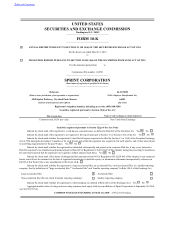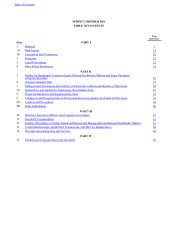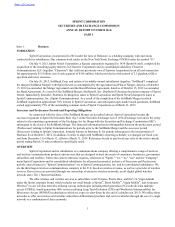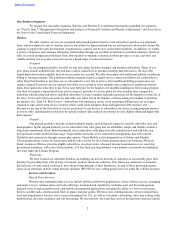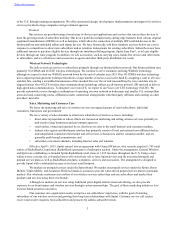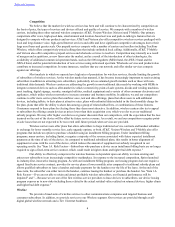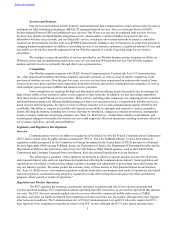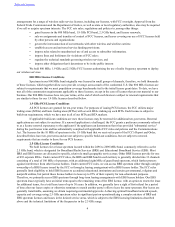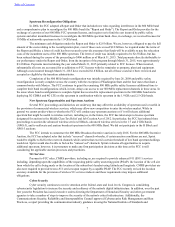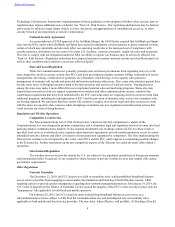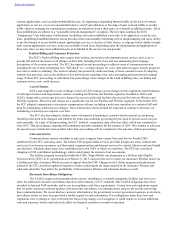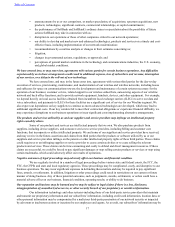Sprint - Nextel 2014 Annual Report Download - page 11
Download and view the complete annual report
Please find page 11 of the 2014 Sprint - Nextel annual report below. You can navigate through the pages in the report by either clicking on the pages listed below, or by using the keyword search tool below to find specific information within the annual report.
Table of Contents
9
content, applications, services and non-harmful devices; (2) impairing or degrading Internet traffic on the basis of content,
application, or service, or use of a non-harmful device; and (3) prioritization or favoring of some network traffic over other
traffic either in exchange for consideration (monetary or otherwise) from a third party, or to benefit an affiliated entity. All of
these prohibitions are subject to a “reasonable network management” exception. The new rules continue the 2010
“transparency” rule with minor clarifications. In addition, the order established a new rule, to be applied on a case by case
basis, prohibiting broadband Internet access providers from unreasonably interfering with or disadvantaging end users’ ability
to use the Internet to access lawful content, applications, service, or devices of their choice, or edge providers’ ability to make
such content applications, services, or devices available to end users. Depending upon the interpretation and application of
these new rules, we may incur additional costs or be limited in the services we can provide.
Truth in Billing and Consumer Protection
The FCC's Truth in Billing rules require both wireline and wireless telecommunications carriers, such as us, to
provide full and fair disclosure of all charges on their bills, including brief, clear, and non-misleading plain language
descriptions of the services provided. The FCC has opened several proceedings to address issues of consumer protection,
including the use of early termination fees, "bill shock" (i.e., overage charges for voice, data and text usage) and has proposed
new rules to address cramming. The wireless industry has proactively addressed many of these consumer issues by adopting
industry best practices, such as the addition of free notifications regarding voice, data, messaging and international roaming
usage. If these FCC proceedings or individual state proceedings create changes in the Truth in Billing rules, our billing and
customer service costs could increase.
Access Charges
ILECs and competitive local exchange carriers (CLECs) impose access charges for the origination and termination
of calls upon wireless and long distance carriers, including our Wireless and Wireline segments. In addition, ILECs and
CLECs charge other carriers special access charges for access to dedicated facilities that are paid by both our Wireless and
Wireline segments. These fees and charges are a significant cost for our Wireless and Wireline segments. In November 2011,
the FCC adopted comprehensive intercarrier compensation reforms, including a multi-year transition to a system of bill-and-
keep for terminating switched access charges. These reforms have decreased and are expected to continue to decrease our
terminating switched access expense over time.
The FCC also has initiated a further notice of proposed rulemaking to consider whether special access pricing
flexibility rules need to be changed, and whether the terms and conditions governing the provision of special access are just
and reasonable. As a part of that proceeding, the FCC initiated a mandatory data collection effort, which was completed in
early 2015. That proceeding is ongoing with comments currently scheduled for the summer of 2015. We continue to advocate
for special access reform but cannot predict when these proceedings will be completed or the outcome of these proceedings.
Universal Service
Communications carriers contribute to and receive support from various Universal Service Funds (USF)
established by the FCC and many states. The federal USF program funds services provided in high-cost areas, reduced-rate
services to low-income consumers, and discounted communications and Internet services for schools, libraries and rural health
care facilities. Similarly, many states have established their own USFs to which we contribute. The FCC has considered
changing its USF contribution methodology, which could impact the amount of our assessments.
The Lifeline program is included within the USFs. Virgin Mobile was designated as a Lifeline-only Eligible
Telecom Carrier (ETC) in 41 jurisdictions as of March 31, 2015, and provides service under our Assurance Wireless brand. As
a Lifeline provider, Assurance Wireless receives support from the USF. Changes in the Lifeline program and enforcement
actions by the FCC and other regulatory/legislative bodies could negatively impact growth in the Assurance Wireless and
wholesale subscriber base and/or the profitability of the Assurance Wireless and wholesale business overall.
Electronic Surveillance Obligations
The CALEA requires telecommunications carriers, including us, to modify equipment, facilities and services to
allow for authorized electronic surveillance based on either industry or FCC standards. Our CALEA obligations have been
extended to data and VoIP networks, and we are in compliance with these requirements. Certain laws and regulations require
that we assist various government agencies with electronic surveillance of communications and provide records concerning
those communications. We do not disclose customer information to the government or assist government agencies in electronic
surveillance unless we have been provided a lawful request for such information. If our obligations under these laws and
regulations were to change or were to become the focus of any inquiry or investigation, it could require us to incur additional
costs and expenses, which could adversely affect our financial condition or results of operation.

